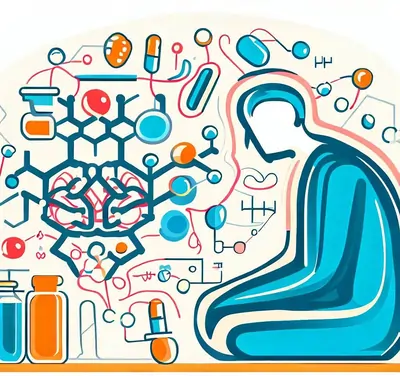How Psychiatric Drugs Work: A Guide for Mental Health Nurses

Psychopharmacology plays a pivotal role in the field of mental health nursing. As a student in this discipline, understanding how psychiatric drugs work is not only essential for your academic success but also crucial for your future career as a mental health nurse. In this comprehensive guide, we will delve into the world of psychopharmacology and provide you with valuable insights into how these drugs work, their classifications, and practical tips on how to approach assignments related to this topic. And if you're looking to complete your nursing assignment, this knowledge will certainly come in handy.
The Basics of Psychopharmacology
Psychopharmacology, at its core, is the science that examines how drugs interact with the brain and its neurotransmitters to influence mental and emotional states. Understanding the principles of psychopharmacology involves delving into the intricate mechanisms through which psychiatric medications alter neural pathways, leading to desired therapeutic effects.
Understanding Psychopharmacology
Psychopharmacology is the field dedicated to unravelling the intricate relationship between drugs and the brain's functioning, as well as their impact on behaviour. This discipline delves deep into the underlying mechanisms through which psychiatric drugs exert their effects on various mental health conditions. By comprehending these mechanisms, mental health nurses can make well-informed decisions in their patient care, such as selecting the right medication, monitoring its efficacy, and assessing potential side effects.

Importance of Psychopharmacology for Mental Health Nurses:
In the role of a mental health nurse, you assume the vital responsibility of administering psychiatric medications, closely monitoring patients' responses, and educating them about their treatment plans. A strong grasp of psychopharmacology is indispensable in ensuring the safety and efficacy of these interventions. It equips you with the knowledge needed to make appropriate medication choices, adjust dosages as required, and address patients' concerns, ultimately facilitating the provision of high-quality care to individuals grappling with mental health disorders.
Types of Psychiatric Drugs
Understanding the differences between these drug classes and their mechanisms of action empowers nurses to make informed decisions when administering medications and monitoring patients, ultimately contributing to improved mental health outcomes.
Antidepressants:
Antidepressants are essential tools in managing mood disorders like depression and anxiety. They achieve their therapeutic effects by modulating neurotransmitter levels within the brain, particularly serotonin and norepinephrine. By increasing the availability of these neurotransmitters, antidepressants help enhance mood and alleviate symptoms associated with these conditions. Mental health nurses must understand the nuances of various antidepressants to make informed choices for patients, as different drugs within this category may have unique mechanisms of action and potential side effects.
Antipsychotics:
Antipsychotic medications play a crucial role in the treatment of severe mental illnesses such as schizophrenia and bipolar disorder. Their primary target is the regulation of dopamine receptors in the brain. By modulating dopamine levels, antipsychotics help manage the often distressing symptoms associated with psychotic disorders, including hallucinations and delusions. Nurses need to be well-versed in the diverse types of antipsychotics and their potential side effects to ensure effective symptom control and patient safety.
Anxiolytics (Anti-Anxiety Medications):
Anxiolytics, also known as anti-anxiety medications, are prescribed to alleviate the distressing symptoms of anxiety and panic disorders. These medications typically act on gamma-aminobutyric acid (GABA) receptors in the brain, which have a calming effect. By enhancing the inhibitory actions of GABA, anxiolytics help reduce excessive anxiety, promoting a sense of relaxation and tranquillity. Mental health nurses should be knowledgeable about the different types of anxiolytics and their dosing regimens to provide appropriate care to individuals struggling with anxiety disorders.
Mood Stabilizers:
Mood stabilizers are a cornerstone in managing bipolar disorder, a condition characterized by extreme mood swings. These medications work by stabilizing the activity of specific neurotransmitters, such as glutamate and gamma-aminobutyric acid (GABA). By regulating these neurotransmitters, mood stabilizers help prevent both manic and depressive episodes, allowing individuals with bipolar disorder to maintain stable emotional states. Nurses must monitor patients closely when administering mood stabilizers to ensure optimal therapeutic effects and minimize potential side effects.
Stimulants:
Stimulants are primarily prescribed for attention-deficit hyperactivity disorder (ADHD), a condition marked by difficulties in focus and impulse control. These medications boost the levels of dopamine and norepinephrine in the brain, leading to improved attention and concentration. Mental health nurses involved in the care of individuals with ADHD need to understand the nuances of stimulant medications, including their potential for misuse and the importance of proper dosage management to maximize benefits while minimizing risks.
Mechanisms of Action
The mechanisms of action in psychiatric drugs encompass complex interactions with neurotransmitters, receptors, and neural pathways within the brain. Each class of psychiatric medication uniquely targets specific neurotransmitter systems, influencing their activity to alleviate symptoms of mental health disorders. This understanding equips mental health nurses with the knowledge needed to predict medication outcomes, manage potential side effects, and provide comprehensive patient education. It forms the foundation for delivering safe and effective care while promoting patient engagement in the treatment process.
Receptor Binding
Most psychiatric drugs work by binding to specific receptors in the brain. For example, antidepressants target serotonin receptors, while antipsychotics focus on dopamine receptors.
Neurotransmitter Regulation
Psychiatric drugs can either increase or decrease the levels of certain neurotransmitters in the brain to achieve therapeutic effects. Understanding these mechanisms is key to comprehending how these drugs work.
Approach to Assignments on Psychopharmacology
When writing your nursing assignment related to psychopharmacology, begin by conducting thorough research from reputable sources such as academic journals and textbooks. Creating a structured outline will help in organizing thoughts and ensuring that all essential aspects are covered. Additionally, incorporating real-world case studies and clinical examples into assignments can demonstrate practical knowledge and its application in the field of mental health nursing, enhancing the depth and relevance of the work.
Research and Information Gathering
When tasked with assignments related to psychopharmacology, start by conducting thorough research. Utilize reputable sources, such as academic journals, textbooks, and government health websites, to gather information.
Organize Your Thoughts
Create an outline before you begin writing your assignment. This will help you structure your content logically and ensure that you cover all necessary topics.
Address Practical Applications
Highlight the practical aspects of psychopharmacology. Discuss how the knowledge of these drugs will aid you in your future career as a mental health nurse, emphasizing the importance of safe medication administration and patient education.
Case Studies and Clinical Examples
Incorporate case studies and clinical examples into your assignment. This will demonstrate your understanding of how psychiatric drugs work in real-life scenarios and showcase your practical knowledge.
Seek Clarification and Feedback
Don't hesitate to reach out to your instructors or peers for clarification or feedback on your assignment. Their insights can help you refine your work and improve your understanding of the topic.
Conclusion
Psychopharmacology is a vital aspect of mental health nursing, and understanding how psychiatric drugs work is crucial for both your academic success and your future career. By grasping the basics of psychopharmacology, knowing the types of psychiatric drugs and their mechanisms of action, and adopting a systematic approach to assignments, you'll be well-prepared to excel in this challenging yet rewarding field of study. Remember, your knowledge of psychopharmacology will directly impact the quality of care you provide to individuals with mental health disorders, making it an indispensable skill for any aspiring mental health nurse.